No CrossRef data available.
Article contents
The Deus ex Machina in Euripides
Published online by Cambridge University Press: 27 October 2009
Abstract

- Type
- Original Contributions
- Information
- Copyright
- Copyright © The Classical Association 1920
References
page 10 note 1 E.g. by Haigh, : ‘The use of this contrivance in Euripides has been much misrepresented by the critics. It has generally been described as the last resort of an unskilful dramatist, when he is unable to find any other solution for the complexities of the plot.’—Tragic Drama of the Greeks, p. 245Google Scholar.
page 11 note 1 As Haigh has pointed out (op. cit. p. 245), Euripides uses it ten times, but only twice—in the Hippolytus and Orestes—to untie the complexities of the plot, and in both of these two instances its use was unnecessary as a ![]() .
.
page 11 note 2 Haigh, op. cit. p. 247.
page 13 note 1 Cf. Murray, Gilbert in Four Stages of Greek Religion (p. 152)Google Scholar: ‘The uncharted surrounds us on every side, and we must needs have some relation towards it, a relation which will depend on the general discipline of a man's mind and the bias of his whole character. As far as knowledge and conscious reason will go, we shall follow resolutely their austere guidance. When they cease, as cease they must, we must use as best we can those fainter powers of apprehension and surmise and sensitiveness by which, after all, most high truth has been reached, as well as most high art and poetry.’
page 14 note 1 See 1354 ff.; 1364–6 etc.


